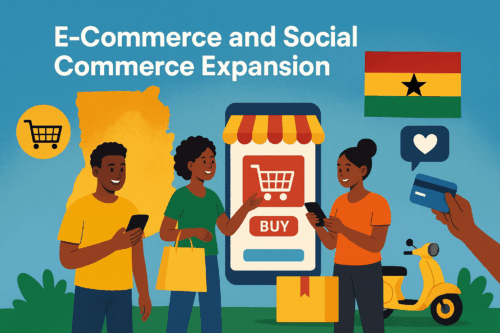E-Commerce and Digital Retail in Ghana: Growth & Future

Introduction: The Digital Shift in Retail
The retail industry is undergoing a dramatic transformation as e-commerce and digital retail continue to shape how consumers and businesses interact. Across Africa, and particularly in Ghana, this shift is fueled by digital payments, logistics innovation, and supportive policies. What was once limited to traditional marketplaces has now evolved into a thriving online ecosystem where convenience, speed, and trust determine success.
The Rise of E-Commerce in Ghana and Africa
Over the past decade, e-commerce has grown rapidly across Ghana. Consumers are increasingly moving online, using smartphones and digital wallets to shop for goods and services. Small and medium-sized businesses are also embracing online platforms to expand their reach beyond local markets. Large companies and international players such as Jumia and Amazon are competing alongside local startups to capture a share of the growing online retail market.
This rise is not just about convenience—it reflects a fundamental change in consumer behavior, where digital-first shopping is becoming the norm.
You can also read about 4th E-Commerce Forum & Exhibition 2025: Driving Business Growth, Entrepreneurship & Youth Development in Ghana
Quick E-Commerce & Digital Retail Checklist
- ✅ Secure official e-commerce accreditation
- ✅ Integrate reliable digital payment options
- ✅ Build consumer trust with transparency
- ✅ Leverage government digital programs
- ✅ Optimize logistics for faster delivery
Advancements Driving Digital Retail
Digital Payments
At the core of e-commerce growth is the expansion of mobile money and fintech solutions. Services like MTN MoMo, Vodafone Cash, and AirtelTigo Money have revolutionized how people pay, creating secure and fast ways to complete transactions. This shift supports the government’s push toward a cashless economy, ensuring that even those without traditional bank accounts can participate in digital trade.
Logistics and Infrastructure
Logistics remain one of the biggest challenges in African e-commerce, but innovation is bridging the gap. Companies are investing in last-mile delivery solutions, fulfillment centers, and real-time tracking systems. These advancements ensure that consumers receive their products efficiently, even in rural areas where infrastructure challenges persist.
Technology and Innovation
Artificial intelligence, chatbots, and automated systems are enhancing customer service and improving supply chain efficiency. E-commerce platforms are increasingly integrating with global trade systems, positioning Ghana as part of a borderless digital economy.
Government Policies and Regulation
The government plays a pivotal role in shaping the future of e-commerce. Ghana recently announced a mandatory accreditation system for all e-commerce businesses to ensure consumer safety and fair trade practices. This regulation will help eliminate fraudulent activities and build trust in the online marketplace.
National ICT Week has also provided a platform for discussions on digital commerce, highlighting the need for a secure environment for online businesses. Initiatives such as ICT for Girls and the One Million Coders Project further demonstrate Ghana’s commitment to building a digital-ready workforce.
These combined efforts signal the government’s ambition to establish Ghana as a reliable and innovative digital trade hub for Africa.
Consumer Protection and Trust
Trust remains a cornerstone of digital retail. Many consumers hesitate to shop online due to fraud and unlawful trading practices. By requiring accreditation, the government is addressing these concerns, ensuring that only verified businesses operate in the e-commerce space.
This not only boosts consumer confidence but also strengthens the credibility of Ghana’s digital economy. As more consumers gain trust, the growth of online retail will accelerate.
Rethinking Protectionism in Retail
Protectionist policies may benefit certain traders in the short term, but they undermine competitiveness and innovation in the long run. A closed system restricts consumer choice and discourages foreign investment.
By adopting open and dynamic retail policies, Ghana can attract investment, enhance consumer welfare, and align with global trends. This approach ensures that the country remains competitive in an increasingly interconnected world.
Opportunities and Challenges
Opportunities
E-commerce offers enormous opportunities for Ghana’s economy. Entrepreneurs can access larger markets, small businesses can scale faster, and job creation is expanding in sectors such as logistics, IT, and customer support. With the right infrastructure, Ghana could become a leader in Africa’s digital commerce transformation.
Challenges
Despite progress, challenges remain. Digital literacy gaps hinder some consumers and business owners from fully embracing e-commerce. Internet costs and infrastructure limitations also restrict growth, especially in rural areas. In addition, cybersecurity threats require continuous investment in advanced security systems to protect both consumers and businesses.
Future of E-Commerce and Digital Retail
The future of e-commerce in Ghana looks promising. By 2030, digital retail is expected to account for a significant share of consumer spending, with mobile money and fintech continuing to drive payments. Logistics innovations and global partnerships will further streamline trade.
If Ghana maintains its momentum in policy reforms and infrastructure development, it could secure its place as a continental leader in digital retail.
Conclusion: Building a Sustainable Digital Ecosystem
E-commerce and digital retail are redefining Ghana’s economic landscape. With advancements in digital payments, logistics, and government regulation, the foundation for a secure and thriving online marketplace is being laid. Consumer trust, entrepreneurial innovation, and supportive policies will be key drivers of future growth.
Ghana has the potential not only to strengthen its local retail sector but also to position itself as Africa’s digital trade hub. By embracing this transformation, the nation is paving the way for a more open, dynamic, and sustainable digital economy.
Expanding E-Commerce Beyond Borders
One of the most exciting aspects of digital retail is its ability to remove traditional borders. Ghanaian businesses that once depended on local foot traffic can now access regional and international markets through e-commerce platforms. With integration into the African Continental Free Trade Area (AfCFTA), cross-border digital trade is becoming more seamless, enabling retailers to expand their customer base far beyond national boundaries.
Global marketplaces such as Amazon and eBay, as well as regional players like Jumia and Tonaton, offer platforms for Ghanaian entrepreneurs to showcase products internationally. This creates a pathway for export-led growth through digital trade, while strengthening Ghana’s economic positioning in the global market.
The Role of Education and Skills in Digital Retail Growth
While technology and infrastructure form the backbone of e-commerce, human capital development is equally critical. Initiatives like the ICT for Girls program and One Million Coders project demonstrate the government’s recognition of the importance of digital literacy and coding skills.
Educating the next generation of entrepreneurs, developers, and digital marketers ensures a continuous supply of talent to sustain the digital economy. With the right skills, young people can develop innovative e-commerce platforms, enhance cybersecurity systems, and provide digital marketing services for both local and global businesses.
This investment in education is not just about jobs—it is about creating a knowledge-driven economy that thrives on innovation and inclusivity.
Building Consumer Confidence Through Secure Digital Commerce
In every digital economy, trust and security are decisive factors for growth. Consumers are unlikely to engage in online shopping if they fear scams or poor service. Ghana’s accreditation system for e-commerce businesses directly addresses this concern.
Accreditation acts as a stamp of legitimacy, ensuring that businesses meet required standards before they can operate. Beyond compliance, platforms must also integrate secure payment gateways, data protection protocols, and transparent refund policies.
By building a trustworthy digital ecosystem, Ghana can accelerate the adoption of online shopping and strengthen consumer loyalty.
How SMEs Can Harness the Power of Digital Retail
Small and medium-sized enterprises (SMEs) form the backbone of Ghana’s economy, and e-commerce offers them unprecedented opportunities. By moving online, SMEs can:
- Reduce operating costs associated with physical stores.
- Access digital payment systems that increase convenience.
- Leverage social media for affordable marketing campaigns.
- Build customer relationships through personalized online experiences.
In an era where physical distance is no longer a barrier, SMEs can become competitive players in global markets with the right digital tools and strategies.
The Path Toward a Digitally Integrated Retail Economy
Looking ahead, Ghana’s e-commerce and digital retail sector will likely evolve toward greater integration with financial services, logistics, and global trade systems. Partnerships between fintech companies, logistics providers, and government agencies will create an ecosystem where businesses and consumers can trade efficiently.
Artificial intelligence will power personalized shopping, while blockchain technologies may soon be used to verify transactions and protect against fraud. With consistent investment and forward-looking policies, Ghana is well-positioned to become a hub of digital retail innovation in Africa.
Final Thoughts
The transformation of retail through e-commerce is not just a passing trend—it is the future of trade. Ghana’s advancements in digital payments, logistics, education, and regulatory frameworks are positioning the country for long-term success in the global digital economy.
For businesses, this is the time to embrace online platforms, adapt to consumer demands, and invest in secure and innovative systems. For consumers, the digital shift offers more convenience, better pricing, and broader access to products and services. And for policymakers, the challenge lies in maintaining a balance between regulation, innovation, and market openness.
By embracing these opportunities and overcoming the challenges, Ghana can not only strengthen its retail sector but also emerge as Africa’s most reliable and innovative digital trade center.
Case Studies and Practical Examples in Ghana’s Digital Retail
1. Jumia Ghana – Leading the E-Commerce Charge
Jumia, often referred to as the “Amazon of Africa,” is one of the most prominent players in Ghana’s e-commerce market. It provides a wide marketplace for electronics, fashion, food delivery, and groceries. By integrating with mobile money services, Jumia has tapped into Ghana’s preference for cashless payments, offering consumers secure and convenient transactions. Its logistics network and delivery partners also showcase how large-scale platforms can overcome last-mile challenges.
2. Hubtel – Blending Payments and Online Shopping
Hubtel is a Ghanaian company that has become a pioneer in digital payments and e-commerce solutions. Originally focused on payment processing, Hubtel has expanded into offering a marketplace where businesses can list their products and deliver directly to customers. Its strong integration with mobile money and bank cards makes it a trusted platform, boosting consumer confidence in digital commerce.
3. Tonaton – Classifieds and Local Trade
Tonaton provides a space for peer-to-peer commerce, allowing individuals and businesses to buy and sell directly. Unlike structured e-commerce platforms, it functions as an online classified marketplace, giving Ghanaians access to second-hand goods, vehicles, and property. While it faces challenges in trust and verification, it reflects the diversity of Ghana’s digital retail ecosystem.
4. Zeepay – Driving Mobile Payments Across Borders
Zeepay, a Ghanaian fintech company, focuses on cross-border mobile payments and remittances, which directly supports e-commerce. By making it easier for Ghanaians abroad to send money and for local businesses to accept digital payments, Zeepay strengthens the financial backbone of digital trade. Its services align perfectly with Ghana’s goal of becoming a digital trade hub for Africa.
5. ExpressPay – Secure Payment Gateway
ExpressPay is another fintech platform making strides in Ghana’s digital retail sector. It provides a secure gateway for online payments, enabling consumers to pay for services, shop online, or purchase tickets with ease. ExpressPay’s reliability has made it a preferred option for businesses looking to build credibility with online shoppers.
6. Kobo360 – Solving Logistics Challenges
Logistics remains a major hurdle for e-commerce in Ghana, but startups like Kobo360 are bridging the gap. By connecting truck drivers to businesses in need of transport, Kobo360 improves supply chain efficiency and delivery reliability. For e-commerce companies, having reliable logistics partners is essential, and this platform demonstrates how innovation can resolve infrastructure bottlenecks.
Lessons from These Case Studies
From Jumia’s large-scale marketplace to Hubtel’s payments-first approach and Kobo360’s logistics solutions, one thing is clear: collaboration between e-commerce platforms, fintech companies, and logistics providers is key to building a thriving digital retail sector.
These businesses illustrate how Ghana is already building the foundations of a secure, innovative, and consumer-friendly digital economy. With continued government support and consumer adoption, they set the stage for Ghana to achieve its ambition of being Africa’s leading digital trade hub.
Strategies for Businesses to Succeed in Ghana’s E-Commerce Space
Success in e-commerce requires more than just creating a website. Businesses must understand the unique challenges and opportunities in Ghana’s digital retail market. Below are key strategies to thrive:
1. Build Consumer Trust Through Transparency
- Provide clear product descriptions, quality images, and honest reviews.
- Offer secure payment options (mobile money, debit/credit cards).
- Implement easy refund and return policies to reduce buyer hesitation.
- Obtain accreditation and highlight it prominently to assure customers of credibility.
2. Leverage Mobile Money and Fintech Solutions
- Ghana’s e-commerce thrives on mobile money platforms such as MTN MoMo, Vodafone Cash, and AirtelTigo Money.
- Businesses should integrate multiple payment gateways (Hubtel, ExpressPay, Zeepay) to reach both local and international customers.
- Offering seamless and flexible payment options ensures wider adoption and customer loyalty.
3. Optimize for SEO and Digital Marketing
- Create websites optimized for search engines (Google, Bing) with relevant keywords like e-commerce in Ghana, digital retail Africa, and secure online payments.
- Run social media campaigns on platforms like Facebook, Instagram, and TikTok to reach younger audiences.
- Use targeted ads and retargeting strategies to convert casual visitors into paying customers.
4. Strengthen Logistics and Delivery Systems
- Partner with reliable logistics companies such as DHL, FedEx, and local startups like Kobo360.
- Offer real-time tracking and multiple delivery options, including same-day delivery in urban areas.
- Build trust by ensuring deliveries are timely and reliable, especially during peak shopping seasons.
5. Focus on Customer Experience
- Deploy chatbots or WhatsApp integration for instant customer support.
- Personalize shopping experiences using AI recommendations.
- Create loyalty programs or discounts to encourage repeat purchases.
6. Embrace Marketplaces and Partnerships
- List products on established marketplaces like Jumia and Tonaton to reach larger audiences.
- Collaborate with fintech and logistics startups for integrated solutions.
- Explore cross-border trade opportunities under the AfCFTA framework.
7. Stay Ahead of Regulations
- Ensure compliance with Ghana’s mandatory accreditation system for e-commerce businesses.
- Keep up with evolving data protection and consumer rights laws.
- Position the business as a trusted, government-approved online platform.
Why Strategy Matters
The Ghanaian e-commerce market is competitive and rapidly evolving. Businesses that adopt trust-building practices, digital marketing, secure payments, and reliable logistics will not only survive but thrive. By combining innovation with compliance, they can tap into Ghana’s growing digital consumer base while positioning themselves for regional expansion
Quick Checklist for E-Commerce Success in Ghana
✅ Earn Consumer Trust
- Be transparent with product details.
- Offer secure payments and easy refunds.
- Display accreditation badges for credibility.
✅ Use Mobile Money & Fintech
- Integrate MTN MoMo, Vodafone Cash, AirtelTigo Money.
- Partner with payment providers like Hubtel, ExpressPay, Zeepay.
- Support both local and cross-border transactions.
✅ Boost Visibility with SEO & Digital Marketing
- Optimize site for search engines.
- Run social media campaigns on Facebook, Instagram, TikTok.
- Use retargeting ads to increase conversions.
✅ Strengthen Delivery & Logistics
- Partner with trusted logistics firms (DHL, Kobo360).
- Provide real-time tracking for customers.
- Offer multiple delivery options, including same-day in cities.
✅ Focus on Customer Experience
- Deploy chatbots and WhatsApp support.
- Personalize shopping recommendations.
- Launch loyalty programs and exclusive offers.
✅ Leverage Marketplaces & Partnerships
- Sell on Jumia, Tonaton, or Hubtel’s marketplace.
- Collaborate with fintech and logistics startups.
- Explore cross-border opportunities under AfCFTA.
✅ Stay Compliant with Regulations
- Obtain mandatory accreditation before operating.
- Follow consumer protection and data privacy laws.
- Position your business as a trusted, government-approved platform.
















